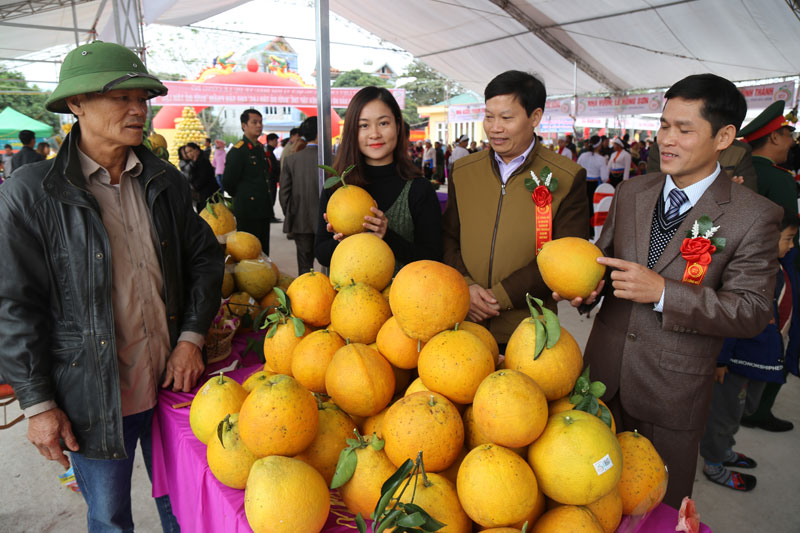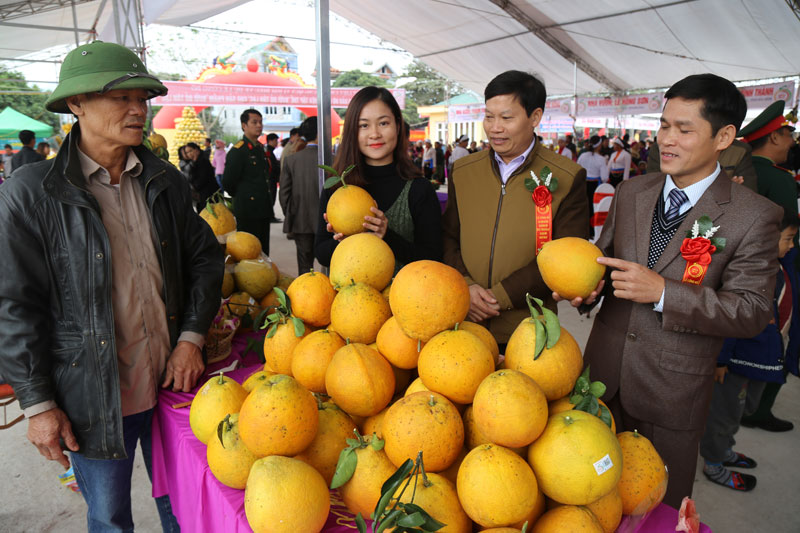
(HBO) – In late November, Muong Bi commune in Tan Lac district, Hoa Binh province, yielded a bumper grapefruit crop with stable prices. The happiness doubled when the Tan Lac red-flesh grapefruit was recognised as a collective mark. This has opened up huge opportunities to promote local products and made significant contributions to shifting crop structure in combination with new-style rural area building.

Tan Lac
red-flesh grapefruit receives collective mark, affirming its own brand
Red-flesh
grapefruit is a traditional tree of Tan Lac district. It was brought by Mr. Nam
Hon to grow in Dong Tien hamlet from the 1960-1970s. The fruit tree is suitable
with the local soil and climate so it has a delicious taste.
Recognising the
potential and strength of this variety, Tan Lac district has issued a
resolution on developing a commercial grapefruit area in 2013-2020 with
specific measures such as supporting farmers in promoting intensive farming and
technology application. About 4-5 years ago, the district had only 100 hectares
of grapefruit, but now the area increases to over 900 hectares, one third of
which have been harvested, mainly in communes along the National Highway 12B
such as Dong Lai, Thanh Hoi, Tu Ne and Man Duc.
The red-flesh grapefruit
is considered the tree with the highest economic efficiency so far, bringing in
steady revenue of 4-5 million VND per tree per year. It is possible to grow 200
trees per hectare. Each tree could produce 150-200 fruits with the current
prices of 20,000-30,000 VND per fruit. Income from grapefruit could reach
500-700 million VND per hectare, even 1 billion VND per hectare in some
households. Some households could rake in nearly one billion VND per hectare.
This year, many families grow only 40 trees but have over 10,000 fruits,
grossing hundreds of millions of VND. These days, customers from Hanoi, Hai
Duong, Ninh Binh, Thanh Hoa and Nghe An have come to buy grapefruits at the
gardens.
Authorities and
people in Tan Lac have been aware of building and preserving the red-flesh
grapefruit brand. Many cooperative groups have been set up to implement safety
production procedures following the Good Agriculture Practice (VietGap).
Particularly, Dong Lai commune has dozens of hectares of VietGap grapefruit
The district
strives to have nearly 1,200 hectares of red-flesh grapefruit by 2020. It is
taking measures to improve management of the fruit’s quality and guiding people
to grow grapefruit to ensure food safety and hygiene. At the same time, the
district is creating a value chain from cultivation to sales of products and
promoting the brand of the Tan Lac red-flesh grapefruit.
According to data from the Hoa Binh Provincial Party Committee, the industrial production index for the first six months of 2025 is estimated to have increased by 20% compared to the same period last year. This marks the highest year-on-year growth rate for this period since 2020.
In the first six months of 2025, Hoa Binh province’s export turnover was estimated at 1.145 billion USD, marking an 18.11% increase compared to the same period in 2024. Import turnover was estimated at $ 804 million, a 17.15% increase, which helped the province maintain a positive trade balance.
The lives of the ethnic minority farmers in Tan Lac district have gradually improved thanks to the new directions in agricultural production. This is a testament to the collective strength fostered through the professional associations and groups implemented by various levels of the district’s Farmers’ Union.
With the motto the "product quality comes first,” after nearly one year of establishment and operation, Muong village’s Clean Food Agricultural and Commercial Cooperative, located in Cau Hamlet, Hung Son Commune (Kim Boi district), has launched reputable, high-quality agricultural products to the market that are well-received by consumers. The products such as Muong village’s pork sausage, salt-cured chicken, and salt-cured pork hocks have gradually carved out a place in the market and they are on the path to obtaining the OCOP certification.
In the past, the phrase "bumper harvest, rock-bottom prices" was a familiar refrain for Vietnamese farmers engaged in fragmented, small-scale agriculture. But today, a new spirit is emerging across rural areas of Hoa Binh province - one of collaboration, organisation, and collective economic models that provide a stable foundation for production.
Maintaining growing area codes and packing facility codes in accordance with regulations is a mandatory requirement for agricultural products to be eligible for export. Recently, the Department of Agriculture and Environment of Hoa Binh province has intensified technical supervision of designated farming areas and packing facilities to safeguard the "green passport" that enables its products to access international markets.



